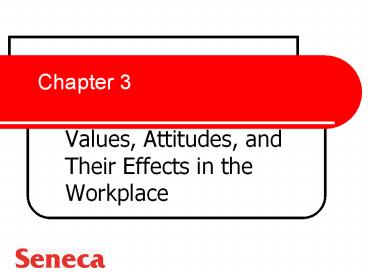Values, Attitudes, and Their Effects in the Workplace PowerPoint PPT Presentation
1 / 20
Title: Values, Attitudes, and Their Effects in the Workplace
1
Chapter 3
- Values, Attitudes, and Their Effects in the
Workplace
2
Values
- Values
- Basic convictions about what is important to the
individual - They contain a judgmental element of what is
right, good, or desirable.
3
Values
- Types of values
- Terminal Goals that individuals would like to
achieve during their lifetime - Instrumental Preferable ways of behaving
- Importance of values
- Values generally influence attitudes and
behaviour.
4
Values vs. Ethics
- Ethics
- The science of morals in human conduct
- Moral principles rules of conduct
- Ethical Values are related to moral judgments
about right and wrong
5
A Framework for Assessing Cultural Values
- Hofstedes Dimensions
- Power Distance
- Individualism Versus Collectivism
- Quantity of Life Versus Quality of Life
- Uncertainty Avoidance
- Long-term versus Short-term Orientation
6
Exhibit 3-2 Examples of National Cultural Values
7
Canadian Values
- The Elders over 50
- The Boomers born mid 1940s to mid-1960s
- Generation X born mid 1960s to early 1980s
- The Ne(x)t Generation born between 1977-1997
8
Canadian Social Values
- The Elders
- Those over 50
- Core Values Belief in order, authority,
discipline, and the Golden Rule - The Boomers
- Born mid-1940s to mid-1960s
- Autonomous rebels, anxious communitarians,
connected enthusiasts, disengaged Darwinists
9
Canadian Social Values
- Generation X
- Born mid-1960s to early 1980s
- Thrill-seeking materialists, aimless dependents,
social hedonists, new Aquarians, autonomous
post-materialists - The Ne(x)t Generation
- Born between 1977 and 1997
- Creators, not recipients
- Curious, contrarian, flexible, collaborative,
high in self-esteem
10
Francophone and Anglophone Values
- Francophone Values
- More collectivist or group-oriented
- Greater need for achievement
- Concerned with interpersonal aspects of workplace
- Value affiliation
- Anglophone Values
- Individualist or I-centred
- More task-centred
- Take more risks
- Value autonomy
11
Canadian Aboriginal Values
- More collectivist in orientation
- More likely to reflect and advance the goals of
the community - Greater sense of family in the workplace
- Greater affiliation and loyalty
- Power distance lower than non-Aboriginal culture
of Canada and the U.S. - Greater emphasis on consensual decision-making
12
Exhibit 3-3 Ground Rules for Aboriginal
Partnerships
- Modify management operations to reduce negative
impact to wildlife species - Modify operations to ensure community access to
lands and resources - Protect all those areas identified by community
members as having biological, cultural and
historical significance - Recognize and protect aboriginal and treaty
rights to hunting, fishing, trapping and
gathering activities - Increase forest-based economic opportunities for
community members - Increase the involvement of community members in
decision-making
13
Canadian and American Values
- Canadian Values
- Protectionist business environment
- Personality more shy and deferential, less
violent, more courteous - More rule-oriented
- Peace, order, equality
- Uncomfortable celebrating success, play it down
- American Values
- Greater faith in the family, the state, religion,
and the market - More comfortable with big business
- Intense competition in business
- Individuality and freedom
- More comfortable with the unknown and taking risks
14
Canada, the US and Mexico
- Canada and the US
- Lower power distance
- More likely to tolerate abrasiveness and
insensitivity by managers - Lower risk takers
- More individualistic
- Less agreeable to teamwork
- Mexico
- Higher power distance
- Managers more autocratic and paternalistic
- Employees defer more to managers
- Greater uncertainty avoidance
- Managers are greater risk takers
- Greater reliance on networks and relationships
15
East and Southeast Asian Values
- East and Southeast Asia
- Guanxi relations based on reciprocation
- Relationships meant to be long-term and enduring
- Enforcement relies on personal power and
authority - Governed by shame (external pressures on
performance)
- North America
- Networked relations based on self-interest
- Relationships viewed with immediate gains
- Enforcement relies on institutional law
- Governed by guilt (internal pressures on
performance)
16
Attitudes
- Positive or negative feelings concerning objects,
people, or events. - Less stable than values
17
Types of Attitudes
- Job Involvement
- . . . measures the degree to which a person
identifies psychologically with his or her job
and considers his or her perceived performance
level important to self-worth. - Organizational Commitment
- . . . a state in which an employee identifies
with a particular organization and its goals, and
wishes to maintain membership in the
organization. - Job Satisfaction
- . . . refers to an individuals general attitude
toward his or her job.
18
Canadian Job Satisfaction
- In 1991, 62 per cent of employees reported they
were highly satisfied with their jobs, compared
to just 45 per cent in 2001. - Almost 40 percent of employees would not
recommend their company as a good place to work. - 40 percent believe they never see any of the
benefits of their company making money. - Almost 40 percent reported that red tape and
bureaucracy are among the biggest barriers to job
satisfaction. - 55 percent reported that they felt the pressure
of having too much to do.
19
Job Satisfaction and Employee Performance
- Satisfaction Affects
- Individual Productivity
- Organizational Productivity
- Absenteeism
- Turnover
- Organizational Citizenship Behaviour
20
Expressing Dissatisfaction
- Exit
- Voice
- Loyalty
- Neglect
21
Summary and Implications
- Values strongly influence a persons attitudes.
- An employees performance and satisfaction are
likely to be higher if his or her values fit well
with the organization. - Managers should be interested in their employees
attitudes because attitudes give warning signs of
potential problems and because they influence
behaviour.

